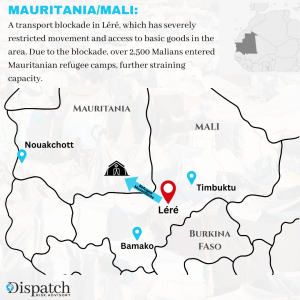Mauritania: Jihadist Blockades in Mali Intensify Refugee Crisis
Summary:
On 13 October 2025, multiple media outlets reported that the Malian town of Léré, near Timbuktu, had been placed under a strict blockade by Jama’a Nusrat ul-Islam wa al-Muslimin (JNIM), the al-Qaïda-linked jihadist coalition.
While initial JNIM control over Léré and nearby areas was reported as early as September 2025, with the group enforcing blockades near the Mauritanian border, the strict siege on the town itself escalated in late October, leading to intensified media coverage in early November.
The siege has reportedly cut all movement in and out of the city, triggered shortages of food, fuel, and medicine, and sparked a new wave of population displacement toward Mauritania. Blockades have multiplied across Mali since September, part of JNIM’s broader strategy of economic warfare through supply disruptions.
In response, Mali’s junta has deepened alliances. This included a November 11, 2025 meeting in Bamako between Russian Deputy Defense Minister Yunus-Bek Yevkurov and President Assimi Goïta to enhance military cooperation in the Sahel, held on the sidelines of the International Defense and Security Exhibition (BAMEX 2025).
According to the UNHCR report, thousands of Malians, mainly women, children, the elderly, and other vulnerable individuals, have recently crossed into Mauritania to escape jihadist blockades. Refugees have entered through both official and informal border points, adding to Mauritania’s long-standing role as a refuge for Malian populations amid ongoing instability.

Outlook:
JNIM and other extremist groups’ activities in Mali and the wider Sahel are expected to intensify in the coming months, particularly in regions bordering Mauritania, due to the withdrawal of international peacekeeping forces, ongoing military operations by Malian and allied forces, and the absence of effective local governance.
While jihadist groups like JNIM have escalated blockades and economic pressure in major Malian cities, including recent pressure in Bamako, experts assess that a full takeover of major Sahelian capitals such as Bamako, Niamey (Niger), or Ouagadougou (Burkina Faso) remains unlikely, as these tactics aim to incite discontent against governments rather than direct occupation.
However, such operations can intensify civilian abuse, potentially fueling further displacement of Malian populations. This is likely to drive continued refugee flows into Hodh Chargui in Mauritania, where a large Malian refugee presence has reshaped local dynamics and continues to put pressure on already limited resources and basic services.
Mauritania will need to maintain and strengthen border surveillance, security measures, and humanitarian support, while its role as a stable buffer in the Sahel may attract additional international engagement and assistance.
Explore our services or speak with our team of North Africa-based risk experts.